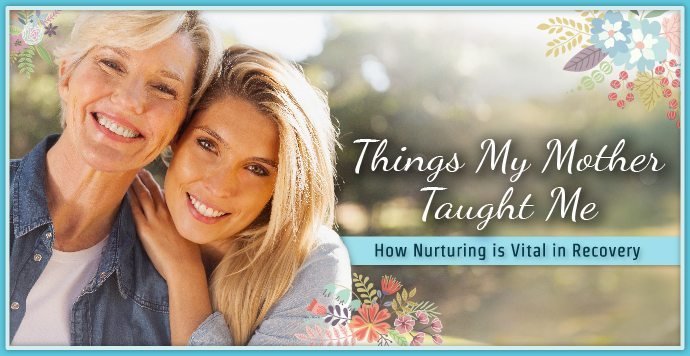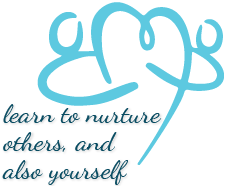Things My Mother Taught Me

How Nurturing is Vital in Recovery
My mom was a helicopter mom before it became fashionable. She always had activities planned for my brother and me whether we wanted to do them or not.
Sometimes that meant trips to the Science Museum in St. Paul, or a giving us list of chores to complete in the garden, or facilitating a visit to relatives at our lake cabin in the summer. Whenever my brother Joe and I weren’t in school, we had our days planned out. Mom wanted to nurture us.
That was fine with me when I was eight or nine years old. Later however, I grew to resent her daily objectives for us. We began arguing in earnest I think the moment I passed the decade mark in age.
From that point on, my mother and I developed a pattern—she planned, I bickered with her, she played the guilt card, I felt bad, and the resentments grew.
 Far be it my goal of this essay to place blame on her, but I do believe our unhealthy relationship set the stage later on for my hidden drinking and drug use. The reality of why people drink and use drugs is always more complicated than we’d like to admit. I do know that, with me, my abuse of drugs and alcohol had a genetic component from my father’s side, which is riddled with not only substance use disorder, but also a mean streak of gambling addiction.
Far be it my goal of this essay to place blame on her, but I do believe our unhealthy relationship set the stage later on for my hidden drinking and drug use. The reality of why people drink and use drugs is always more complicated than we’d like to admit. I do know that, with me, my abuse of drugs and alcohol had a genetic component from my father’s side, which is riddled with not only substance use disorder, but also a mean streak of gambling addiction.
Now that I’ve embraced long-term sobriety in recovery (and after I had my own two kids) I’ve come to realize that, ultimately, my mother always had my best interests in mind.
I’ve also come to the appreciation that she had taught me one important life habit. It’s one that has continued to serve me well in my own life of recovery, and… well… just in life itself—learn to nurture others and also yourself.
Nurturing is the process of caring for (and the growth or development of) any living thing.
You can nurture plants growing in your garden. You can nurture your cat (as much as the cat wants it, of course though). You can also nurture yourself and others, in a way that is healthy and non-controlling.
Nurturing isn’t only for mothers, either—although our society likes to link nurturing primarily to mothers (and celebrate it for Mother’s Day), the fact is nurturing is a vital component of what it means to be a human being. Amazingly, my mother taught me that caring for others (and for myself) is an important task of what it means to be human.
In fact, these three big ideas make nurturing an extremely relevant topic within a program of recovery from addiction and drugs:
1. Caring for Others Gives You Purpose and Meaning
If there is one big point I hit hard in recovery (and also in my writing and speaking) it’s that purpose and meaning are the gas we put into our engines to drive our lives.
Without a purpose for living, we find waking up in the morning a difficult (and sometimes insurmountable) task. Lack of purpose is like adding a pack of sugar into your gas tank—a car’s engine will never run the same, if at all.
Without a meaning in life, it gets more complicated. I’ve found that life’s meaning for me has changed throughout the different phases or periods of my recovery. When I was still in treatment, the only nurturing I did was to simply make it through each day—withdrawal and learning to manage again are brutal!
However, as I entered into a later phase of recovery and entered a sober-living environment, I had to decide what I was going to be spending my time doing within a career. Only after I saw my  talents for what they are—a gift of putting words together for others to find meaning—then I soon discovered I had found a meaning in my life. I knew that I could reach out through my writing to touch others’ lives. Soon, I learned that providing for my family gave more meaning to my life than I had ever imagined, but I could only become a provider after I first became healthy myself.
talents for what they are—a gift of putting words together for others to find meaning—then I soon discovered I had found a meaning in my life. I knew that I could reach out through my writing to touch others’ lives. Soon, I learned that providing for my family gave more meaning to my life than I had ever imagined, but I could only become a provider after I first became healthy myself.
The process of finding meaning and purpose is different for everyone. Still, finding your own direction to reach out to others is a side of nurturing which will shift your recovery into high gear, because you’re not only living for yourself, but for the people you care about most.
2. Finding Your Own Nurturing Side Will Make You More Gentle
Think about it—when has there ever been a time when you’ve had to live with (or around) other people? The answer will differ for everyone, but let’s face it—human beings are social creatures and we don’t live in a vacuum!
Part of Twelve-Step recovery that I believe applies directly to anyone’s program of recovery is that we do not recover simply by ourselves. For the longest time, I tried to go it alone, and let me tell you: it’s hard, if not impossible.
The fact of the matter is that recovery is part of a complex illness of both mind and body. Addiction often has a social component to it as well. Although my use was primarily something I did alone, my isolation was a prescription for disaster. After I found a new life in recovery, I discovered that my willingness to listen to others and relate to their stories was something I had been looking for. Finally, I was not alone. Indeed, I never really had been before!
 When I took the time to gently listen to where others were at in their own process of recovery, I discovered a new, nurturing side of me I wasn’t aware existed. I also uncovered a great gift—developing my own nurturing response without judgment or resentment allowed me to be more gentle in other areas in my life, like waiting on the phone to talk to customer service. In the past, I was continually angry that things weren’t going my way. Today, I’m calmer. Finding my own nurturing side gave that to me.
When I took the time to gently listen to where others were at in their own process of recovery, I discovered a new, nurturing side of me I wasn’t aware existed. I also uncovered a great gift—developing my own nurturing response without judgment or resentment allowed me to be more gentle in other areas in my life, like waiting on the phone to talk to customer service. In the past, I was continually angry that things weren’t going my way. Today, I’m calmer. Finding my own nurturing side gave that to me.
3. You Can Nurture Yourself
This discovery was probably the biggest one for me after I finally got sober. I had no idea that every person has the ability to effectively nurture themselves.
The biggest reason people often cite for lack of self-care is that they say they don’t have the time. But making time for nurturing yourself is actually how one needs to go about it.
Before I got sober, I planned my day around getting high. If I couldn’t get the pills that I wanted, I went for the “old reliable” (and easy to obtain), alcohol. After I used, I was temporarily relieved from the stresses of life… or so I thought. What I was actually doing was covering up the problems and adding another layer of problems on top of them. Addiction is hell because it only gets worse. There is a reason why experts know it’s a progressive disease.
The good news is that there are things you can do to care for yourself and nurture good habits to give you a new—and ultimately more fulfilling—life! Meditation is key for me. I take time to actively relax and focus. Amazingly, this is all meditation is—actively relaxing and refocusing our lives to effect a positive personal change.
The other side of nurturing I pursue is spending more quality time with my family. When I was active in my addiction, all I cared about was scoring and getting high. Family time came afterwards, if at all. Now, I take the time to go outside with my boys and make dart guns and do some gardening with them. For you, this will be different, but it’s self-nurture nonetheless, and I know that you’ll find that it will make a difference for you as well.
Daniel D. Maurer is a freelance writer openly living in long-term recovery. He is the author of Sobriety: A Graphic Novel, a Hazelden Publishing, youth and young adult resource. Daniel is currently working on his fourth book, which covers the topic of resiliency. He lives with his family in Saint Paul, Minnesota.




